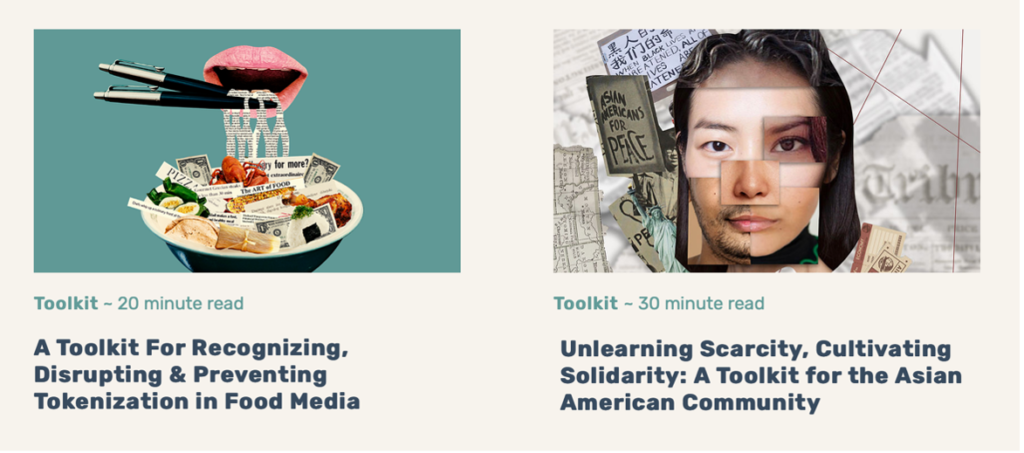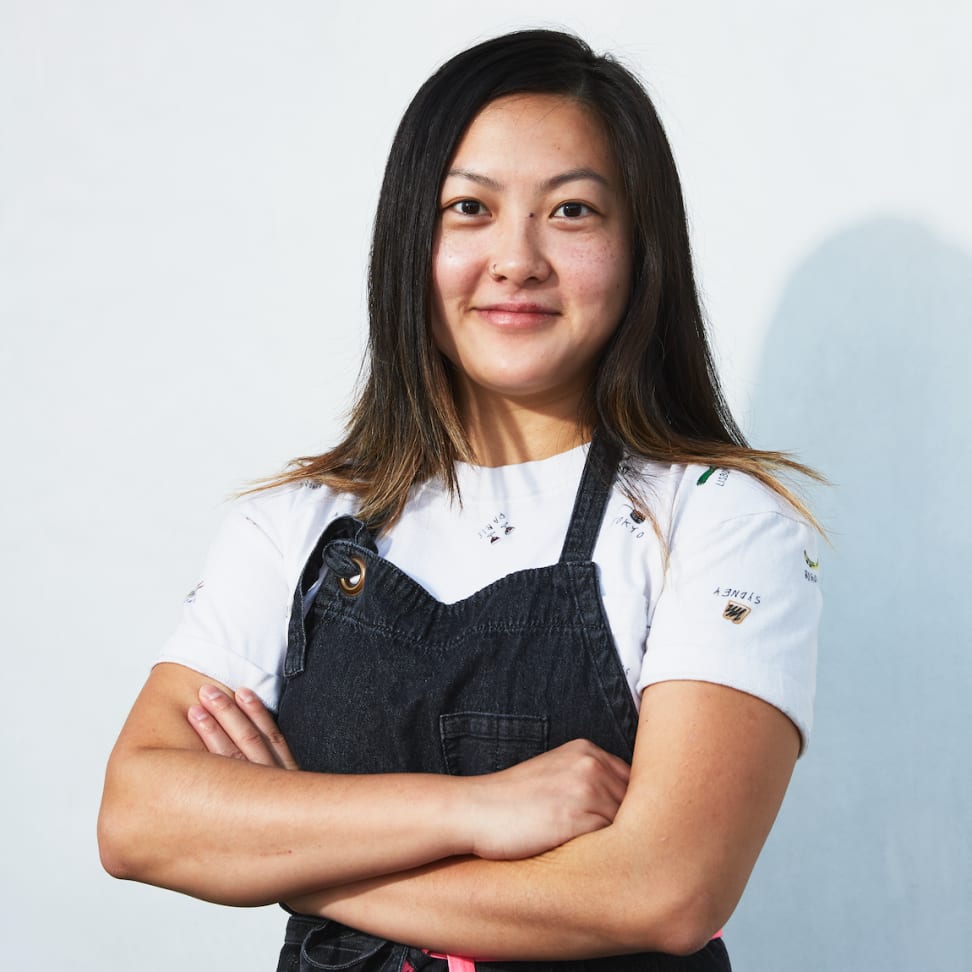Photo: Alicia Cho
Throughout history, food system changes have been significant drivers of human behavior. While food has often been used as a means to wield power over others, it can also be understood as a vehicle to redistribute it. To learn more, we sat down with recent Vital Brown Bag speaker, Jenny Dorsey, who is a professional chef and founder of Studio ATAO, a nonprofit organization that leverages food and hospitality to build community and foster change.
Why did you decide to start Studio ATAO, and how has the organization’s work evolved throughout the years?
Studio ATAO grew out of a dinner series I started back in 2014. I was working as a chef and my husband as a mixologist, so it was the perfect fusion of both of our skillsets. I realized that I wanted the people I was bringing together around the table, who came from all different backgrounds and experiences, to have serious conversations about race and other social justice issues. This spurred the creation of more focused events such as our dinner series, “Asian in America,” and later developed into wanting to help enact structural changes and engage in conversation with major stakeholders, which is how our community think tank was born. More recently, as an organization, we began to develop resources to help make creating the changes we wanted to see clear, plain and available for free. We want to pull down barriers and encourage people to be change agents in their society.

What were some of the themes that were visited in your “Asian in America” dinner series that are important to understand and untangle, particularly given the recent wave of anti-Asian hate and violence in the country?
One of the things we’ve been reiterating a lot is that anti-Asian hate and violence is nothing new. It has always been here in the U.S. but has been shrouded in the model minority myth. That sort of violence and hate doesn’t randomly spring up overnight. This is important to understand because we can’t change the future if we do not understand the past.
What was important for us with the “Asian in America” dinner series was that we set the stage so that people understood how complicated the Asian American experience is and how oppression often works in a very hidden way within different Asian American identities. I also thought it was important for people to know that the event was just my experience. I think one of the traps we tend to fall into, especially when you’re a marginalized identity, is that you get tokenized for every one of your identities. Your experience is perceived as universal. I wanted to be able to create a space where others could also share how they experience life.
While we haven’t been running the series during the pandemic, we have been creating toolkits for the Asian American community. One of the things we’ve been talking about frequently is scarcity mentality and how it manifests for Asian American people and for Black, Indigenous and other people of color more generally. When you’re not accustomed to seeing people like you, you feel like you’re always in competition with others and have this deep-seated notion that there’s not enough space for you.
What are your thoughts on how public health approaches food?
Public health organizations, as well as other major organizations that oversee the benefit of society, often conduct themselves in paternalistic ways. This frequently includes presenting a moral binary: you’re a good person that eats healthy or you’re a bad person that eats unhealthy foods. This ignores a lot of systemic issues. A study that informed my take on this was one in which sociologists followed mothers who had a higher socio-economic status and mothers who had lower socio-economic status as they went food shopping and ate meals over the course of several years. What they found was that introducing new, healthier foods, such as broccoli, to kids meant that many times the food was rejected before the kids learned to accept it. When you don’t have a lot of discretionary income, you can’t afford that. If we are always worrying about individual decision-making instead of worrying about why people are put into situations where they have to choose between several subpar outcomes, then we’re not addressing the real problem.
To that point, I think it also doesn’t have to be either-or; we can tax things that are not great for us but at the same time address the larger problems. Are people opting for sugary beverages because they need calories and it’s the cheapest way to acquire them? Instead of trying to make an unhealthy choice overtly seem “bad” to guilt people to not choose it, how do we expand the choices that people do have? Can we work to have the prices of a healthier drink reduced, for example? One of the major points that history shows us is that the lack of choices people are afforded should ask us to be more kind and generous and to try to understand them better instead of shaming them for making the “wrong” decision—we should be criticizing the structures that took away their decision-making power.
How can food serve both as a mechanism of division but also help build bridges between people and cultures?
Because of the nature of food—where we all need it to survive—it is a good way to understand why people do what they do. Fundamentally food is part of the way we see the world and build relationships with one another. On the positive side, it’s a way we can understand each other. Not only are foods native to different places but if you look at different climates, there are a lot of interesting parallels. For example, many people in subtropic zones have similar fermentation or cooking styles since it’s hot and food doesn’t keep as long. A lot of times you have to ferment or pickle things in order to preserve them and that gives rise to all these interesting food cultures around the world. There are so many interesting ways to understand people’s histories and perspectives of the world through food.
But on the other hand, because it is so integral to our existence, food is always going to be used as a mechanism for control. If you look at why there was such a profound rush to enslave people in the Caribbean it was because of the abundance of sugarcane that grew there. To extract sugar from sugarcane is a really laborious process so in order to have the amount of sugar that western Europe wanted, they used slave labor. As another example, in North America, settlers broke the Native American population’s relationship to the land in a really harmful way. Native American people were resettled into different climates with different soils and as a consequence lost knowledge of ancestral foods and how to prepare food based on the land that they came from. This has led to many negative health outcomes we still see play out today. Food is an important way to talk about these things because it is accessible and sometimes feels more tangible than larger, abstract policies.
How can food be used to help redistribute power?
I think the best road map that we have for a movement to redistribute power is food sovereignty. The Declaration of Nyéléni at the first global forum on food sovereignty defined it as “the right of peoples to healthy and culturally appropriate food produced through ecologically sound and sustainable methods, and their right to define their own food and agriculture systems. It puts the aspirations and needs of those who produce, distribute and consume food at the heart of food systems and policies rather than the demands of markets and corporations.” There’s so much to learn from this statement alone. I’m always drawn to the language on the right of people to define the systems that shape their future. If we accept this as a fundamental human right, then the systems we are designing also need to be resilient enough to accommodate the entire spectrum of people who rely on them. This means every solution is co-created by the members of the community for all the members of the community, because we are taking responsibility over the wellbeing of one another.
To learn more about Jenny Dorsey and her work, please visit: www.jennydorsey.co or www.studioatao.org.
About Vital Strategies
Vital Strategies is a global health organization that believes every person should be protected by a strong public health system. We work with governments and civil society in 73 countries to design and implement evidence-based strategies that tackle their most pressing public health problems. Our goal is to see governments adopt promising interventions at scale as rapidly as possible. To find out more, please visit vstrategystage.wpengine.com or Twitter @VitalStrat.
